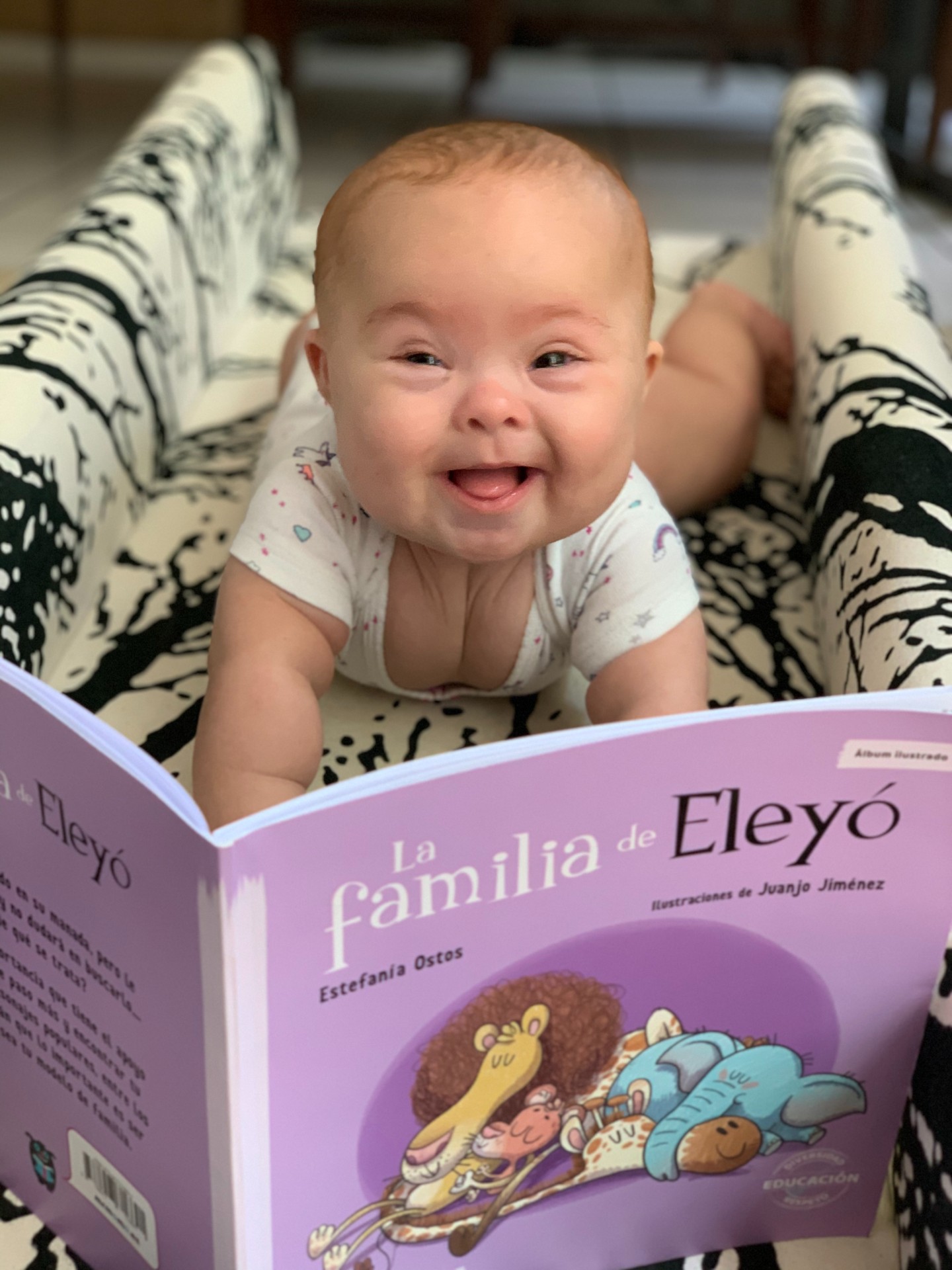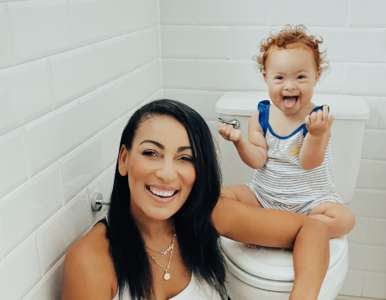If you follow me on Instagram (if not, maybe you should!), you have seen me sharing little videos of my son, Lennox, singing or chatting – probably in the back of the car, since before COVID we spent so much time there during the week! Every single time I share videos of him talking, I get lots of private messages asking me how I got him to speak so much since such a young age. Honestly, we have not done anything out of the ordinary when it comes to technical tools. However, I believe that what I have done differently than other people is not underestimating his learning capabilities.
When my son was a newborn, I read an article that said “from birth to age three, babies gain more than a million neural connections every second. This crucial period of brain formation will affect how a person learns, communicates and behaves for the rest of their lives”. Do you know the conclusion I made when I read that? That babies are actually way smarter than we are and their learning abilities are much greater than those of us teaching them. We just need to equip them with tools to make those connections.
Armed with that knowledge, I started working on his language development from birth. And now I want to share with you the TOP 5 things we do daily that have helped develop his language skills. One common factor that you need to add to each of this tips is COMMITMENT. In order for this to work, you truly need to be committed to communicate with your child and do it A LOT! I am not joking when I tell you that I have spent hours talking to my son every single day since birth. Do it even when they are so young that they cannot reciprocate yet. Trust me, you won’t regret it!
- Do not underestimate their learning abilities.
As mentioned above, babies are much more capable of learning than we are. Do you know how often I hear: “she doesn’t understand yet!”. Well, when you are not given the opportunity to learn something, it is simply impossible to learn it. My son recognized and was able to name the vowel letters at 15 months because I gave him the chance to learn them. I know that many people thought I was crazy trying to teach such a young kid the letters, but given the opportunity to learn them, he did!
While I did this in a more structured way, there are teaching opportunities all around us every single day. You can teach colors by naming the colors of the cars around you during a trip, and you can teach tons of words by naming the objects you see during a walk (i.e. “look, that is a trash can”). The opportunities are truly endless if you use your imagination and keep your eyes opened.
- Describe everything around them, especially actions.
When I was pregnant, I asked one of my best friends how she got her son to be so eloquent. She told me that she had always described what was going on around them to him. Since birth. I took that to heart and I started talking to my son through the day about what we were doing. If I was changing his diaper, I’d say: “look, we are changing your diaper. This is a wipe and we use it to get you all clean. You will feel much better once we are done”. And on and on.
I basically became a narrator of our day for him. I still do this today but now we have little conversations and it is much more fun. Yes, it is tedious doing it when the child cannot respond to you with words, but every single time you describe actions for them, you are helping them make those brain connections I mentioned above. Be persistent, results will come!
- Read WITH them not TO them
What does that mean? Do not make the child a recipient of your reading. Encourage them to point at things even when they are really little. Grab their little hands and say: “oh look, there’s the dog!” Get those little brains engaged!
My son LOVES books. Now that he is mobile, I can get him to sit for a long time to read several books in just one sitting. One of the issues I see many moms face is the child not wanting to sit to read. I believe that when you start to read at a very young age – aka when they cannot move yet – a connection is made that reading happens sitting. But, if your child needs to move, do not stop! Keep reading! They still hear what you are saying and that brain is still processing information.
I personally chose books that tell a story versus books for very young children that only list words. We also use those, but I can simply point at objects during our daily activities and use our reading time to help him understand more advanced concepts. Some of our favorite books are “You are friendly”, “Arthur’s birthday“, and “The Bremen Town Musicians“. All these books are recommended for children 5 or older but we have been reading them since my son was around 1. Now he can almost recite all of those stories and fully understands what they are about!
- Listen to music with intention.
I am sure that you play music for your child, but using music as a learning tool is incredibly effective during early childhood. My son has attended music class since he was 7 months old. And I remember that on his first day his teacher told us how much music was going to help him with his language development. She was SO right! We listen to music several hours a day (mainly in the car, but I also incorporate it in tons of activities). Music makes teaching fun and less like a chore.
Do not only just play music. Sing along, explain to the child what the song is about. Encourage them to repeat the sound. Even when they cannot repeat it yet! Because not encouraging them to repeat it, will not make them want to even try. When you encourage them to do so, the day will come when they surprise you with a response!
Be creative! I cannot tell you how many songs I have invented! We have a “good morning” song I made up, as well as a “diaper changing” song or a “we are going to the park” song. Not only it will make your child learn tons of words, it will help create a very special bond between you two. We listen to tons of different music but one of our favorite albums is by ChuChu TV and it has multiple songs in English and Spanish.
- Listen and engage even when they cannot talk yet.
I feel I have already included this throughout the post BUT it deserves its own bullet because I think this is one of the most common “mistakes” we can make when it comes to helping our children develop their language skills. It is assumed that we do not need to pause and give the kid a chance to engage simply because they cannot reciprocate yet. I think this is a huge mistake. If you do not teach the child what a conversation looks like, how are they suppose to learn it?
Not only talk to them about their surroundings and what is going on, but also pause and wait for a “response”. When they are really young and they cannot talk, look for a response in their eyes. Have you given the child a chance to find the object you are describing with their eyes? If not, pause and point at it. Once they are looking at it, acknowledge it! “Oh, you found the tree I was telling you about. Isn’t it pretty?”. Pause again. Let the baby know that he is an active participant in what is happening. You will be amaze at how much more you will get out of them if you teach them that the communication is not one-sided.
I know that life gets really busy and adding things to do to our very long lists may feel overwhelming at times. Do not get discouraged and incorporate these tips into your daily routines. With the exception of reading (which I cannot emphasize enough how important it is to include in your child’s daily routine), the rest of the things we do are easily incorporated throughout the day.
I also want to recommend you a few accounts I follow on Instagram that have tons of activities: @new_tricks_kids , @everydayplayhacks , @mothercould. Not all of the activities shared on those account are focused on language skills BUT remember that ANY activity you do with your child can also be used for language development if you describe in detail what you are doing. I hope that you enjoyed reading about the top 5 things we do daily to help my son’s language skills.







8 Comments
by Fanny Ostos
Totalmente a favor de esa estimulación diaria cuando son bebés y sobretodo hay algo tan sencillo como hacerlo durante los paseos, es verdad que cuando no hablan puedes parecer la loca que habla sola por la calle, pero de verdad que para ellos es muy beneficioso, conocer el mundo a través de tus palabras y hacer esa conexión con su visión los ayuda muchísimo. Y es muy sencillo y al alcance de todos, solo hay que cambiar el enfoque de los paseos, hacerlos partícipes. Cuando van creciendo recoges esos frutos y te sientes muy orgullosa de lo logrado. No importa la edad del bebé, solo importa todo lo que tu le puedes ofrecer.
by Sandy Bodeau
De acuerdo!
by Ashley Ziemann
LOVE the read with them not to them. Very informative thank you!!!
I’m interested to know since you have a bilingual household how do you teach your kids each language? Do you consciously speak to them in each language (ex: you mainly speak in Spanish & your husband speaks in English) or is it just they pick it up?
by Sandy Bodeau
Great question! I will write a detail post on this. Short answer: we chose the OPOL method to raise our kids bilingual. OPOL stands for “one parent one language”. I speak to them 100% in Spanish and their Dad speaks to them 100% in English. It has worked great for us this far and my oldest is now completely fluent in both at 3 years of age.
by Viki
Sin duda alguna esta niña vino a ese mundo para hacerme mejor persona❤️❤️❤️❤️
by Sandy Bodeau
Desde luego!
by Natacha
Gracias!! Si practico alguna de las cosas que mencionas pero hay muchas otras que no había tenido en cuenta, ya mismo empiezo!!
by Sandy Bodeau
Cuentame como los vas usando! Me alegra que te sirvieran los consejitos!
Comments are closed.